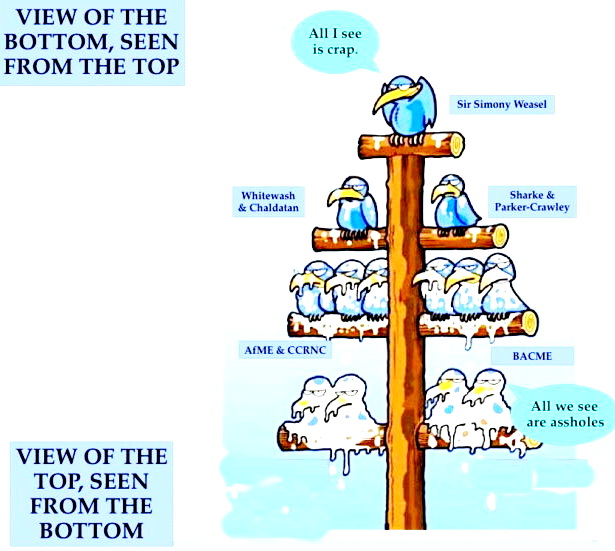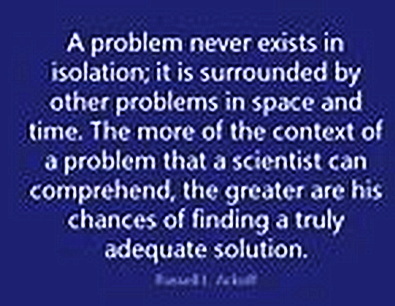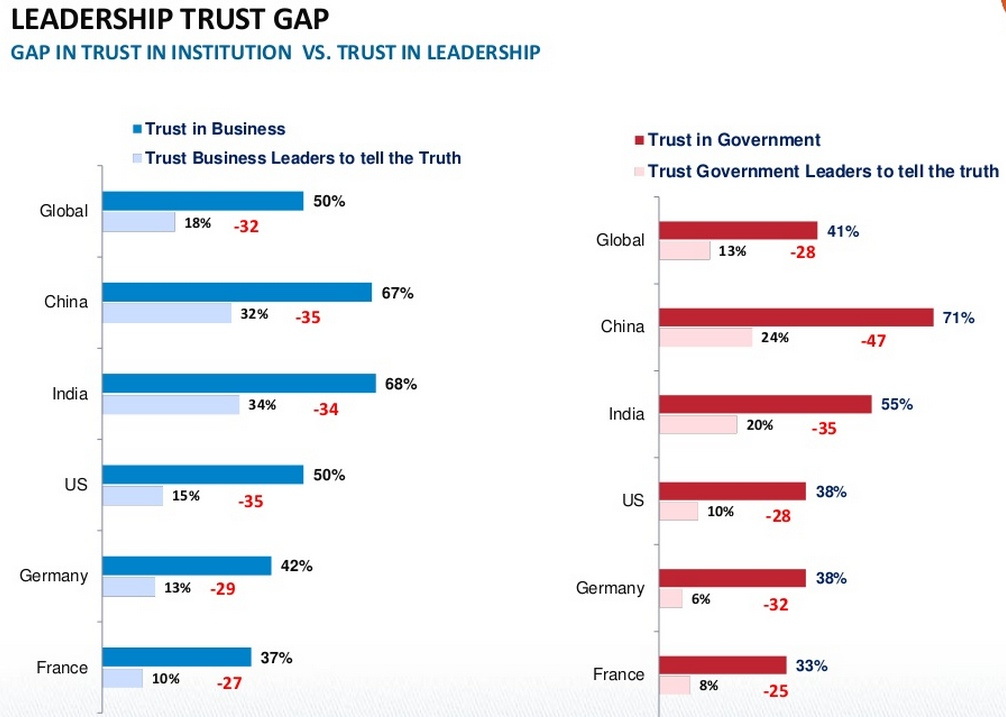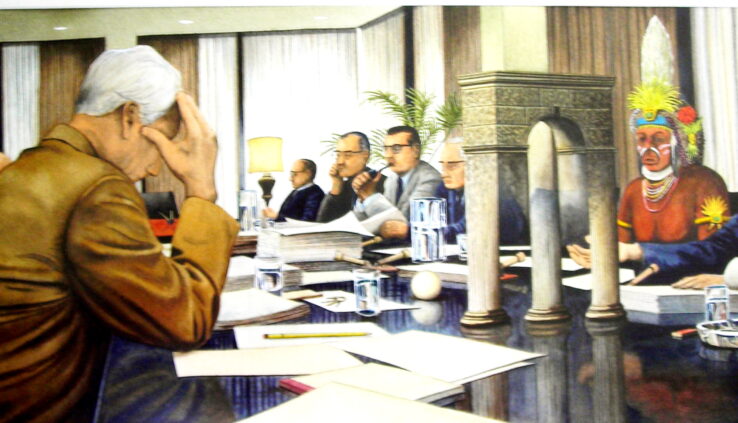Systems views of social behavior
The first perspective on this dilemma comes from the PE practitioners of Plan B, developers of this website. It is the “systems” view we know delivers the best results. We lived it with Plan B development for more than four decades. It covers:
- Individual behavior (Crusoe)
- Social behavior (hierarchy)
- General to all human behavior
Some background
Going through engineering university was a seamless continuation of learning about the causes and effects in reality. We chose to become PEs to extend our devout fascination with reality. Avid readers, we found nothing in fiction that was more incredible and phenomenal than what we experienced in real life. True to this day.
University degrees in hand, we entered brute reality, looking forward to practicing our craft. As you can well imagine, it didn’t take long for us to discover that, in adult life, reality takes a back seat to other values actually used by society for choosing its behavior. Why does society choose to deny reality for its navigational system? Well, for sure it isn’t for survival of our species. Our take is simple:
- Our systems view of the individual person is Crusoe, uncontaminated by irrational social values. In operation as a “system” Crusoe is unknowable, unfathomable, and unpredictable. His variety in behavior knows no bounds. To use reductionism on individual behavior is to forego any chance to “know” him. Personality is everything to his survival.
- Our systems view of the social system begins with its size and architecture. If the collective is small with less than three layers of hierarchy, its variety in behavior as a system is somewhat less than Crusoe, but still unpredictable. Personality of its staff, masters and apprentices, matters a great deal.
- When the collective is equal to or greater than three levels of hierarchy, its nobrainer-natural variety in behavior as a system approaches zero. Accordingly, system predictability approaches 100%. This social system condition is the focus of our efforts. The behavior of the tall hierarchy is understandable and its trajectory has been reduced to a table lookup. As you know, personality of its members matters not a bit.
- As there are no material obstacles to turning a self-defeating nobrainer organization into a flourishing one, a fullbrainer, the entire affair is certifiably psychological. Nothing in our engineering education prepared us for this dimension of sociotechnical reality. The proof of concept came in 2013 when Plan B became operational. It was only after implementations of generic Plan B were in service did we learn why the problem had never been solved by the billions of people that came before us. You must experience Plan B in operation to appreciate its social system. You can use the ongoing Eastern European war as an example of a Plan B nation in a Plan A world.

Other system views of social behavior
Other system views of social behavior that were gathered included those produced by the eminent psychiatrist R.D. Lange in the 1960s. He got into systems think about social behavior when he faced the reality – that his profession was failing to restore the legally insane to sanity standards. Like the great Carl Rogers in psychotherapy, he recognized that the reductionist approach being used in the mental health business was not working.
The “other” system views from our library have been consolidated and structured.

Other Takes: General
We are psychologically-damaged goods that cannot begin to think, feel, or act except from the starting point of our own alienation. Humanity is estranged from its authentic possibilities. Our alienation extends to our roots.
Strangers to ourselves, to one another, and to the material world, we can glimpse but not adopt. Born into a world where alienation awaits our arrival, it is achieved by violence perpetuated by human beings on human beings. Go figure.
Working on the effects of reality’s processes does nothing to illuminate the causes of reality’s processes. Persons experience the world, whereas things behave in the world. Thing-events do not experience. There is an ontological discontinuity between human beings and it-beings. Humans relate to each other by the relations of the two worlds of experience that come into play when two people meet. The study of human beings without this relationship is more violence and mystification.
Demanding to experience the evidence, our quest is making concrete the best possibility of mankind in the real world. We must accept final responsibility for what we make of what we are made of.
There is little conjunction of truth and social reality. Around us are pseudo-events, to which we adjust with a false consciousness adapted to see these events as true and real, and even as beautiful. In the society of men the truth resides now less in what things are than in what they are not. Our social realities are so ugly if seen in the light of exiled truth, and beauty is almost no longer possible if it is not a lie. Can we do more than sing our sad and bitter songs of disillusion and defeat? The “fix” to social dysfunction requires more than a passionate outcry of outraged humanity.
On Norms
Today, people are the passive vehicles of inhumane processes whose ends are as obscure as they are out of their control. The behavior toward each other in a hierarchy is determined by experience and personal intentions however alienated we are from them.
The ‘normal’ alienated person, by virtue of the fact he acts like everyone else, is taken to be sane. The condition of alienation, of being unconscious, of being out of one’s mind is the condition of the normal man, highly valued by society. The Establishment educates children to lose themselves and to become absurd, and thus to be normal.
Most people are prepared to trust an untested hypothesis produced by indefensible science. They will make believe what they experience. Their faith is a belief in a reality that does not exist.
To be or not to be
As you know, being and non-being is the central theme of all philosophy, East and West. Still, we are afraid to approach the fathomless and bottomless groundlessness of everything. The ultimate terror in OD is to be told “There’s nothing to be afraid of.”
The ground of the being of all beings is the relation between them. Man creates in transcending himself in revealing himself. You are the witness, the medium, the occasion of the happening that the created thing makes evident.
If there are no meanings, no values, no source of sustenance or help, then man as creator must invent meanings and values, substance and succor out of nothing. He will get little social support for his troubles. Acts of creation are despised and craved. Creativity forms bridge-heads into alien territory, taken as acts of insurrection.
The source of creativity comes from a zone of man where he cannot descend. This zone of no-thing, of the silence of stillness, is the source. Everyone is there all the time. An activity has to be understood by the experience from which it emerges. These mental acrobatics that embody mathematical physics, only glimpsed by a few as beautiful and exquisite came from the threshing and thrashing of drowning men. They didn’t know that where it all ends, there it all begins.
“Is” serves to unite everything at the same time “is” is not any of the things it unites. Yet, ‘is’ is the condition of the possibility of all things. Is is that no-thing whereby all things are.
The central role of experience
Our behavior is a function of our experience. We act according to how we “see” things, including people. If our experience is destroyed, our “selves” being lost, our behavior will be destructive.
There is a need for concepts that indicate the interaction and inter-experience of two persons. Need for understanding the relation between each person’s own experience and his own behavior – within the context of the relationship between them. Need to conceive of this relationship within the relevant contextual social system. To develop a theory which contains all theories and practices within the scope of a total vision of the ontological structure of being human, will require solving the problem of what relationship is the best possible? Projection and introjection do not bridge the gap between persons.
- Any theory that focuses on experience and neglects behavior is incomplete.
- Any theory of social behavior not founded on the nature of being human is a lie and a betrayal of man.
- You will not find social intelligence in behavior you judge to be inhumane.
- The physical environment offers us possibilities of experience or curtails them. It is never neutral.
There are many subtle distinctions between the experience of negation and the negation of experience. All experience is both active and passive, the unity of the given and the construed. It is what you desire or fear or are prepared to accept, or it is not. It includes the narrow zone between provisional hope and permanent despair.
So estranged from the operational reality is the perpetrator that his step one is to deny that it exists. Man cut off from his own mind, a half-crazed creature in a mad world.
This condition is largely the work of violence perpetuated by society on each of us and by each of us on ourselves. We act on our experience at the behest of the others, just as we learn how to behave in compliance to them. Human beings have become so self-brutalized, banalized, stultified, that they are unaware of their own debasement. They have lost all criterion of objective reality, of being taken seriously, like politicians.
Since every aspect of human alienation is falsifiable, a positive description can only perpetuate the alienation, which it cannot describe, succeeding only in further deepening it.
Enemies of a flourishing humanity achieve their purpose, POSIWID, by a successful masking of what is and what is not, by a serialization of the world of the observer by turning the truly given (reality) into capta which are taken as given, by denuding the world of being and relegating the ghost of being to a shadow land of subjective ‘values.’ Capta is maltreatment that refers to a repeated pattern of parental behavior that is likely to be interpreted by a child that he or she is unloved, unwanted, or serves only instrumental purposes and/or that severely undermines the child’s development and socialization
The choice of syntax and vocabulary are political acts that define and circumscribe the manner in which facts are to be experienced, thus changing the facts.
What one is suppose to want, to live for, is ‘gaining pleasure from the esteem and affection of others.’ If not, one is a psychopath. This statement describes the frightened, cowed, abject creature that we are admonished to be – if we are normal – offering each other mutual protection from our own violence. The family runs a protection racket – encouraged by society. Nothing is but what it is made to be by the alchemy of social conditioning. So far, no one has found a limit to the capacity of humans to deceive themselves. We are expected to comply by inner consent with external constraints, forthwith.
We do not live in a world of unambiguous identities and definitions, needs and fears, hopes, delusions. The social realities are ghosts, specters of the murdered god and our own humanity returned to haunt and destroy us. The texture of the fabric of these socially-shared hallucinations is what we call reality and our collusive madness is what we call sanity. This madness exists in the interstices of our most intimate and personal moments. We see others as the reflection of the occasion of our own self-division.
Experience may be judged to be invalidly mad or to be validly mystical. Each society has its own characterizations of behavior as deviant. People behave in different ways because their experiences of themselves is different. Psychotic experience goes beyond the horizons of our common, communal sense – our norms
Each person, not being himself, whether to himself or the other, just as the other is not himself to himself or to us. No wonder modern man is addicted to other persons and the more addicted, the less satisfied, the more lonely. (50 years before social media)
The Other is everywhere and nowhere. The other that governs everyone is everyone in his position, not of self, but as other. However, every self-disavows being himself that other that he is for the other. The Other is everyone’s experience. Each person can do nothing because of the other, everywhere elsewhere.
- It is axiomatic that behavior is a function of experience. And both behavior and experience are always in relation to someone or something other than self.
- The task of understanding social reality is to experience and to conceive the concrete reality in its fullness and wholeness, causes and effects. We have fragments.
Much of social behavior consists of bilateral attempts to eliminate experience. There is no contiguity between the experience of one person and that of another. My experience of you is always mediated through your behavior.
When people are socially entangled, the behavior of each towards the other is mediated by the experience by each of the other. The experience of each is mediated by the behavior of each. There is no contiguity between the behavior of one person and that of another.
Inter-experience is concerned with your behavior and my behavior as I experience it and your and my behavior as you experience it. Science is never about the way things experience us. There is no traditional logic to express it.
Strip a man from his experience, his deeds, and he is bereft of his humanity. We are both acted upon, changed for good or ill by other men and we are agents, interexperiencing and interacting to affect “others” in various ways.
It is easy for this process to run amuck. It will require an act of imagination from those who do not know from their own experience what hell this borderland between being and nonbeing can become.
It’s not enough to destroy experiences. You must overlay this devastation by a false consciousness inured to its own falsity. In the mystification of experience, exploitation must be seen as benevolence. Persecution must be seen as kindness. The government destroys your capacity to see clearly any more what is in front of you, and to imagine what is beyond your nose.
The focus is on two origins of experience in relation. To mismanage the relationship simply perpetuates the disease it purports to cure.
When intolerant of different fundamental structures of experience, all sorts of stress is placed on relationships. The collective representations come to be experienced as things, exterior to anyone. Imposing a social norm puts an oppressive obligation on everyone, without anybody noticing the frenetic passivity it created. No one knows how to stop this alienation of ourselves from our experience, our experience from our deeds, our deeds from human authorship. Everyone is carrying out orders.
Whoever seeks to control the behavior of large numbers of other people have to control the experiences of those other people so they voluntarily form a baitball for self-protection. Once variety is eliminated and individuals aggregated, it’s engulf and devour. The collective is men by themselves arranging themselves in patterns, strata, assuming and assigning different powers, functions, roles, rights, and obligations. The group can be nothing but the multiplicity of the points of view and actions of its members and this remains true everywhere this synthesized multiplicity becomes ubiquitous in space and enduring in time.
Nexus ethics exists only by each person’s experience of it. If there is no external danger, it has to be invented and maintained. Each person has to act on the others to maintain nexus in them.

Various system-think observations
- No one is ipso facto sane.
- In social behavior there is no-thing between. The ‘between’ is itself nothing. The relations are entangled subconscious minds with no-thing between the participants. Without the miracle of entanglement, nothing happens.
- It is not a question of putting something into nothing. It is about creating something out of nothing, Ex nihilo. The experience of creation and nothing. There is no ‘thing’ out of which the creation emerges. It is not empty space. One cannot put a sound to soundlessness, a taste to tastelessness.
- Groups break up because of turnover, a kind of evaporation, like the Gadarene swine.
- The more the patient actively tries to extract himself from the nuthouse, the more the staff thinks he needs to be there.
- Reality is the fabric of the world’s experience. We are socially conditioned to regard total immersion in outer space and time as normal and healthy. Immersion in inner space and time is regarded as anti-social withdrawal, a deviancy, discreditable, invalid, and pathological per se.
Systems views on the way things are
- We are living in an age of great change and increasing rates of change. The foundations of society are crumbling. Even though we have no direct experience in other times and places, we know it is true today.
- Insecurity is everywhere. Because the ultimate basis of our world is in question, we scurry into roles, statuses, identities, and interpersonal relations. There is no firm ground in the social realm of today on which to build. Everyone is witness to this state of affairs. The dilemma is beyond dispute.
- Few appreciate how insubstantial the pageant of external reality can be, how it can fade and fully realize the sublime and grotesque presences that can replace it and exist alongside it.
- There are insurmountable contradictions in our drive to influence the external world without intelligent husbandry on our inner world.
- The counter-madness of psychiatry, the exact counterpart of official psychosis, is madness as well.
- From the alienated starting point of our pseudo-sanity, everything is equivocal.

On the Individual
To understand man in human terms is, for all practical purposes, impossible. Do they subordinate themselves to fate? To the configuration of the zodiac? Men often estrange themselves from themselves by self-mystification.
We experience in different modes. Most people experience the world and themselves in a consistent identity within a framework of certain concepts of space and time, shared with other members of their society. Identity-anchored, space and time bound experience. It conveys a sense of self-validation as an illusion. Like the misery, confusion, disorientation of someone blind from birth given sight.
Sanity is directly connected to a capacity for adapting to the external world, the operational reality of human collectives. As you experience the world, so you act. Since you are an ecosystem, this capacity must include your inner world as well. You can’t divorce one part of yourself from another part without dire consequences to your effectiveness in social affairs The ways to lose your way are legion.
Old purposes no longer seem viable: old meanings are senseless: the distinctions between imagination, dream, external perceptions often fail to comply in the old way. Imagination may seem to be objective reality. The inner self is as bereft of substance as the outer self is bereft of meaning.
When you split the individual and insist on grabbing this without that, the dissociated evil returns to permeate and possess the good and turn it into itself. Your selective blindness is an invitation to reality to bring havoc into your life. It takes a violation of self to live in conformance to a civilization driven to its own destruction. Afraid to live and afraid to die, it is a life of angst and insecurity.
When in reality denial, one cannot even think about the behavior that is at the annihilating edge. What we think is less than what we know: what we know is less than what’s attainable. To that precise extent we are so much less than what we are. Carried forward to its logical conclusion it begs the question: who are we to decide getting better is hopeless?
In the journey to understanding, there are many occasions to lose your way, for confusion, partial failure, even final shipwreck; many terrors, spirits, demons to be encountered that may or may not be overcome.
- The biochemistry of a person is highly sensitive to social circumstances.
- Social adaptation to organizational dysfunction (OD) is very dangerous. All trajectories into its future are problematic.
- Depression is illness and irreality, perverseness and distortion, invented by each in order to live in an unlivable situation.
- Every action of one person is expected to have reference to and to influence everyone else. The nature of the influence is expected to be reciprocal. This reciprocal transpersonal cause-effect is a self-actualizing presumption. Showing gratitude is the highest form of social action.
- In the collection of reciprocal indifference, of reciprocal inessentiality and solitude, there is no freedom.
- The source of our experience seems to be outside ourselves. We are separated and joined by our different perspectives, educations, backgrounds, organizations, group-loyalties, affiliations, ideologies, socio-economic classes, and temperaments. To name a few.
- No one makes us suffer. The violence we perpetuate and have done to us, the recriminations, reconciliations, the ecstasies and the agonies, are based on the socially-conditioned illusion that two actual persons are in relationship. This dangerous state is hallucination and delusion, a mishmash of fantasy, exploding and imploding, of lost trust, reparation, and revenge.
- In youth you are taught there is no real reality. “Don’t believe your lying eyes.”
- To attain the possible in social behavior, you insist on being human. The only honest beginning to a relationship is to share its absence.
- Reticuloendothelial and endocrine systems transact. They are not persons.
- As long as you are one on one with self or ‘other’ the only way you can act is on your own experience or the other’s experience. That’s it.

Personal action:
- validating
- Confirming
- Encouraging
- Supporting
- Enhancing
OR
- Invalidating
- Disconfirming
- Discouraging
- Undermining
- constricting
Creative or destructive are the only choices. In a world where the normal condition is one of alienation, bet on pervasive destructive interaction. It comes overlayed with a thick patina of mystification.
There are various ways to alienate yourself:
- Denial
- Repression
- Splitting
- Projection
- Introjection
- Depersonalization
- reification
These mechanisms of action are subconscious – you are unaware you are doing it to yourself. You see it as an impersonal process which has taken over, which you can observe but not control. You thereby dissociate yourself from your own action. You become part of a person, invaded by destructive psychopathological mechanisms in the face of which you are a helpless victim.
To reverse the self-alienation, first comes awareness. Then you have to realize these are things you do or have done to yourself. Process becomes converted back to praxis so you can become your own agent. It is possible to regain the ground that has been lost.
The first ways reality is experienced underpins our subsequent encounters and actions and it is what psychologists call fantasy – a particular way of relating to the operational reality. It is experiential and meaningful and sprinkled about our collection of experiences. There seems to be no agent more effective than another person in bringing reality alive, or by his countenance shriveling up the reality in which one is lodged.
The other person’s behavior is an experience of mine. My behavior is the experience of the other. The field of study of the relation between experience and experience is inter-experience. It is impossible for me to see your experience of me. Likewise, my experience of you is invisible to you. We are both invisible men. Experience is the only evidence.
In terms of experience, man is the center of orientation of the objective universe. In terms of behavior, man is the origin of task actions. Personal experience transforms a given issue into intention and action. Only through action can our experience be transformed. Everything human occurs in a social field of reciprocal influence and interaction.
Human experience is not in your head, it is out there in the arena of interaction. Theory is the articulated vision of experience. We can see other people’s behavior, but not their experience.
The condition of alienation from reality, of being unresponsive, of being out of one’s mind, is the condition of the normal man.
The ordinary person is a shriveled, desiccated fragment of what a person can be. Sigmund Freud
We retain just sufficient proprioceptive sensations to coordinate our movements and to get provisions for survival. Beyond that little or nothing.
Our capacity to think beyond what we are dangerously deluded in supposing is our self-interest, and in conformity with common sense, is pitifully limited. So shrouded in veils of mystification that significant unlearning is necessary before reality can be usefully experienced. As domains of experience become more alien, greater open-mindedness is necessary to even conceive of their existence. Few understand fantasy as a modality of experience and the contrapuntal interweaving of different experiential modes. Accordingly our experience is divorced from our behavior and radically estranged from the attainable structure of being.

Social
The social scene is a scene of mirages, demonic pseudo-realities. Everyone believes everyone else believes them. Scandal is always and everywhere elsewhere. Social behavior can always be traced back to the experience and actions of each and every single person repudiating his own identity.
The social group has no agency of its own. While it has no consciousness, we may still shed blood for this bloodless presence. The We is a form of unification of a plurality composed by those who share the common experience of its ubiquitous invention among them. The cement of unification is a common desire to attain a goal, a project activity.
To reach the best attainable state, each social system requires internal transformation of the persons who comprise it. These are not simply different roles: each is a whole past, present, and future, offering different degrees of change or inertia, different kinds of closeness and distance, different sets of rights and obligations, different pledges and promises. Individuals have not just one set of internalized objects to carry around, but various internalized social modes of being from one context to another, many in contradiction, unremittingly incomprehensible. There are no basic emotions, instincts, or personality, outside of the relationships a person has within one or other social context.
Depersonalization is alienating the man from his experience, a hostile act that triggers reciprocity.
The protection that a social system offers its members is based on three preconditions:
- A fantasy of the external world as extraordinarily dangerous
- The generation of terror inside the nexus at this external danger.
- The nexus delivers violence to security.
Various
With complete indifference to the other’s own existence of destiny, children are turned into imbeciles, like ourselves, complete with a high IQ. Social conditioning is geared to destroy their potentialities. When finished, we are left with a being like ourselves, a half-crazed creature acclimated to a mad world. The question is: why is this happening?
The fear of loss of identity with change is ubiquitous. If society is untrustworthy, you can’t have confidence in the integrity of the self. You become a one-dimensional man in the baitball configuration.
In a social situation where zero-sum competition for the surplus of producers created by their productivity is a pivot of action, there can be no trust. Aggression (++), inherent in zero sum, does not foster cooperation and collaboration. The essential nightmare is fast-acting and cannot be undone without protracted benevolence (+ -). The irony in this destructive behavior is that zero-sum competition is seldom legitimate. It has become a game that is more important to preserve than the participants.
How have we the courage to wish to live, preserve ourselves from death, in a world where love is provoked by a lie and consists solely in the need of having our sufferings appeased by whatever being has made us suffer? Marcel Proust (1950)
Family homeostasis is the product of reciprocities mediated under the statutes of violence and terror.
When enlightenment strikes and angst disappears, it is unpredictable, unique, unforgettable, and always unrepeatable and basically indescribable.
Views: 76


